The following stories were originally compiled for the Mixed Migration Review 2023 and have been reproduced here for wider access through this website’s readership.
This is a series of in-depth and personal stories, based on interviews with refugees and migrants who migrated regionally in Africa, the Americas, and Asia.
Leaving Eritrea is hard and illegal
“Sometimes I thought we are going to be kidnapped.”
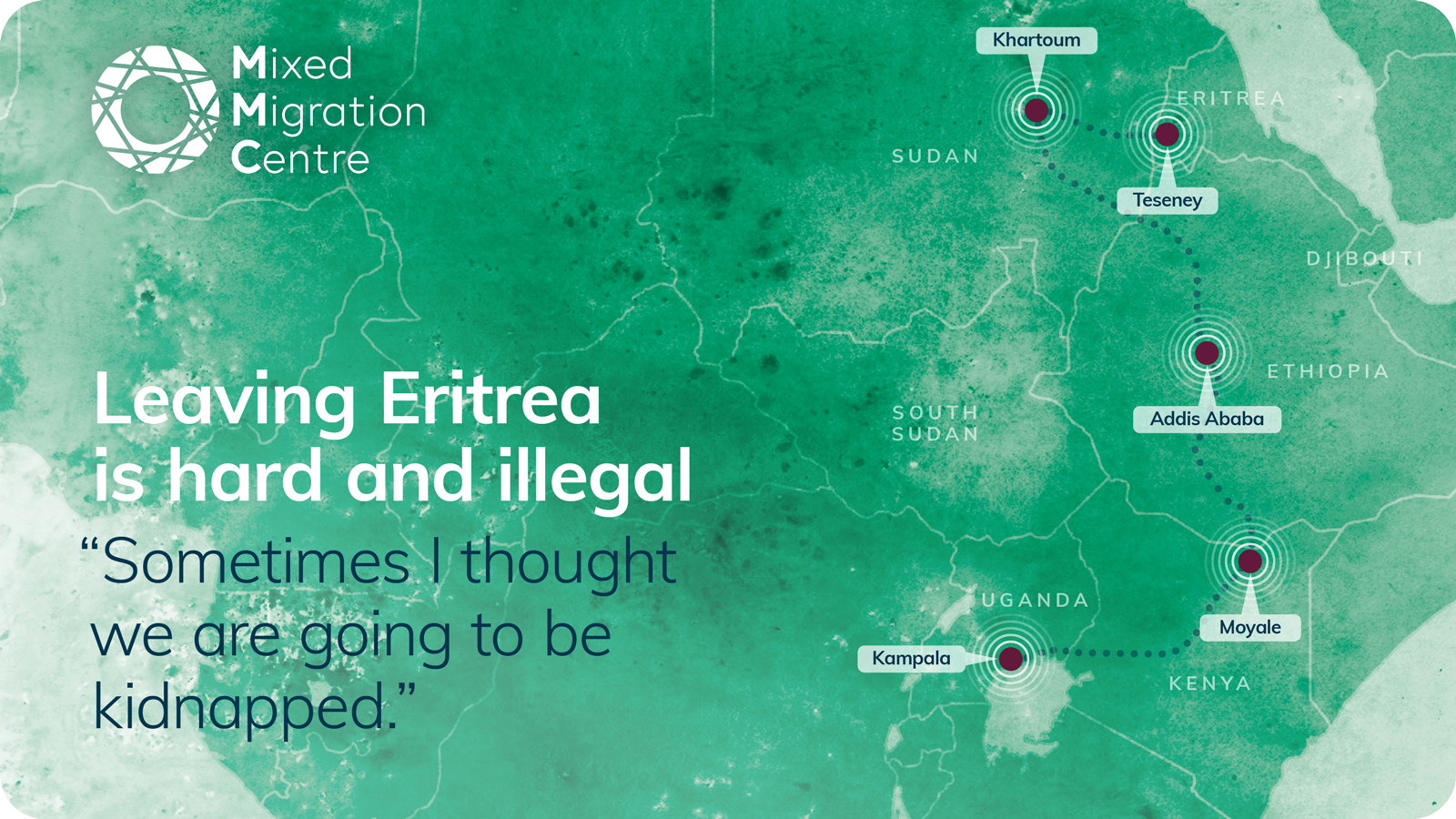
I had to use an agent (smuggler) to get out. The first one kept changing the travel dates and in the end things didn’t work out so I had to make arrangements with a second agent before finally setting off for the Sudanese border in a group of 25 people. Food and water were scarce and sometimes ran out. The agents mistreated us, but this was only because they were also in a bad situation where if they get caught, they risk getting imprisoned for life. Food and water at this point is the least of their worries.
It took twelve days to walk to the border town of Tesseney. It is very dangerous for newcomers there because officials can ask you questions any time and report you to the police, who will then arrest you and you will be taken to Adi Abeto prison. Crossing the border can only be successful when done at 2 a.m. in complete silence. Some guards there are lenient as they are aware of the situation of their people. Once in Sudan we went by truck to Khartoum where I went to stay with some cousins. But Khartoum was not a safe place at the time, so I decided to move on to Addis Ababa. Travelling from Khartoum to Addis Ababa is very expensive: agents were charging $2,000 to arrange for a car and it takes five days. The border is not very bad, all we had to do is stay quiet in the back of a truck.
I then reached Ethiopia and I can now speak fluent Amharic. I looked for a job and I was about to start in a boutique. The people in Addis are nice and are hospitable because we Eritreans have a similar culture and religion. I love Addis, but my sister, who lives in Sweden, urged me to move to Kampala because she feared I might be imprisoned or even killed because of the war in Ethiopia. She also found me an agent.
Although I paid an agent for the journey from Addis to Kampala in a private car, he made me go alone using public transportation. On the way to Moyale, on the border with Kenya, nobody stopped me and the journey was smooth. I had to pay some money to enter Kenya even though I explained I was a refugee and had no money. Once I got into Kenya, I met up with 20 other people that the agent had gathered. We spent five days in one room with no food. We were also instructed to stay quiet or else we would be arrested. After five days, they set up a tent at the back of a pickup truck; at the time we were 30 people and we could not breathe. The driver was intoxicated and irresponsible. It was a bad journey. We were moved to a van which was better as only 14 people were in it. The journey from Kenya to Uganda was long. Sometimes I thought we were lost or that the agents were going to kidnap us. Two weeks after leaving Addis we finally reached Kampala. It cost $3,000 from Asmara to Addis and then $2,000 from Addis to Kampala.
Life in Kampala is very difficult and not very safe. The other day, one of our neighbours was heading to work at 7 a.m. and he was kidnapped. May God help him. We don’t know where he is now. Robbery is also very prominent. I once asked for a job as a receptionist, but the pay was not enough even for transport, let alone rent. Rent is very expensive. You can’t find rent below $100 per month. Despite their hospitability, Ugandans blame high rent on the Eritreans, assuming that we can afford it. Little do they know, we have no option but to pay the demanded rent as this is not our homeland. And market traders charge Eritrean refugees five times the going rate for groceries. In police stations, officers demand 100,000 Ugandan shillings (about $30) from refugees even though they don’t have the right to do so. They also harass us and threaten to imprison us.
University life in Morocco
“Our quality of life here makes us want to stay.”
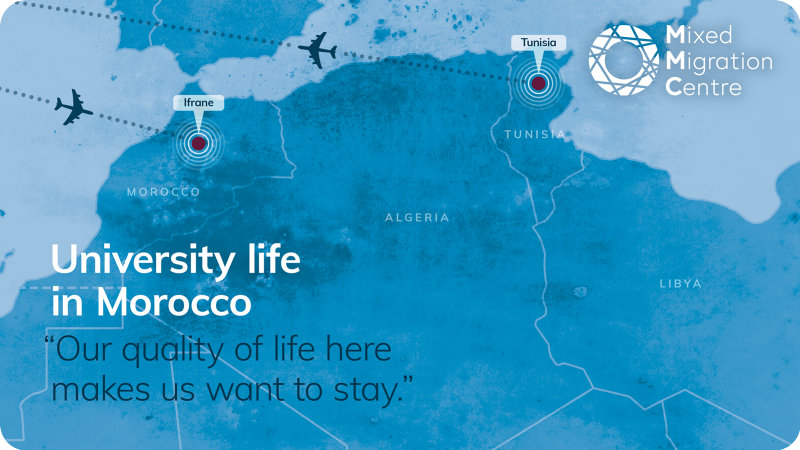
Whenever we returned to Morocco from travelling abroad, I used to get stopped on arrival but my husband and daughter did not because of their American passports. Every time, they took my picture and my fingerprints. I used to say: “You let my husband and daughter come in easily but not me, even though I am the North African, I am the Tunisian!” This, however, stopped when I got my residency.
I have got used to this small city. This is a good place for a family, especially for my two little girls. We live in a nice apartment in the university compound. It is filled with expats: French, Germans, Americans, Indonesians… we have one Algerian with us, Indians as well, a few Egyptians, one Iraqi, one Palestinian, and Moroccans, of course. I have mostly French and Moroccan friends. People here are super nice. There is zero stress, zero traffic, it’s so clean and the nature is so beautiful.
The locals treat us nicely. We’ve never faced any incidents. I don’t think people here they treat the Europeans or Americans better than us Tunisians. On the contrary, I feel like sometimes I get treated better: they are so happy when I say I am Tunisian, whether it is the police, taxi drivers, or the guy selling fruits. What I like most about Ifrane is the security, peace, help at home with the girls, our salary (I don’t think we can make the same salary in Tunisia) access to health and education. There is no traffic. I finish work—I teach French at the school attached to the university—at 3:30 pm and I am at home by 3:40.
But at my daughter’s school, the Moroccan parents are always afraid of other nationals, especially when it comes to religion. I did not face these problems because maybe I am Tunisian, but my American friends did. During Christmas time for example, Moroccans are afraid of the Christian influence, so they email the teachers telling them, “Don’t do Christmas decorations, we don’t do that here.” I feel that this is very contradictory: you put your children in international schools and yet you expect them to be only exposed to Moroccan culture. These are the same parents who would send their kids to study abroad right after their baccalaureate.
Each year we ask what is making us stay in Ifrane and what makes us want to leave. It is always the salary, the security, the quality of life we have here that make us want to stay.
My husband would still like to move to Tunisia if he finds a good job that allows us to live comfortably. But even though I am the Tunisian in the couple, I don’t want to go back there mostly because of the political situation there. Like many young people, we had hopes things would improve back in 2011, but every year those hopes fade.
We have thought about moving to a Scandinavian country, only because of the educational system there, which we think that our daughters would love. It is better than the one here, and even better than France. The decision to move (to anywhere) is dependent on the type of job offer and money, because we live comfortably in Morocco.
If we stay here in Ifrane I would like to open a café culturel, like a co-working place but with good coffee. I want to improve the French and Arabic departments in our school, I want the students—and my daughters—to graduate with speaking English, Arabic and French fluently. Next year, I will be the head of the department for Arabic and French, so I am planning to work on that dream.
In the next couple of years, I think Morocco will be a destination country for other Arabs. There is money here. Of course I am not talking about politics and the socioeconomic problems, but in terms of opportunities for jobs, for young people, it will be an amazing country.
Learning about life in Dakar, Senegal
“A person without a vision doesn’t know where they’re going.”
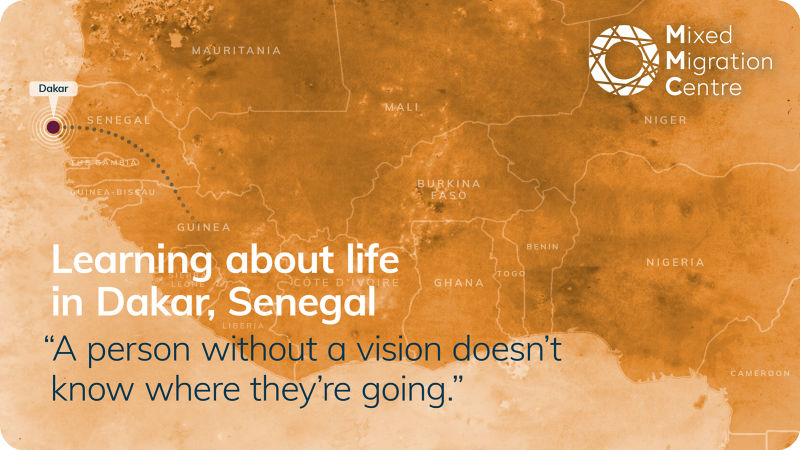
When I first got to Dakar it was during the Covid-19 lockdown. I came with 350,000 CFA francs (about $570), but I couldn’t reach the aunt I was supposed to stay with and had to go to a hotel where I paid 15,000 CFA francs ($25) per night. After staying there I had spent almost half of my money. Also, because I don’t speak Wolof, taxi drivers often overcharged me. After falling victim to a housing scam, I spent six months sharing a room with a hairdresser and a mechanic. These days, I usually live alone, but right now I am hosting a friend from Guinea who, like me when I first arrived, is having trouble finding his own place.
Now I have a residency card that is valid until 2025. I know the Guinean consulate well because I was a member of the Association of Guinean Students in Senegal, who help with consular logistics. There are many Guineans registered in Senegal. There are students and some shopkeepers and others. Some of them have had similar experiences to me. My friends are among them: they are involved in business or social organisations to help migrants. Some of them also have master’s degrees and others have even started to work here permanently. Some have made a life for themselves here and others did all their education and have families here. They are well integrated here and many have no plans to return to Guinea.
Before coming here I had always had it easy. In Dakar I suffered a lot for the first time and learned a lot about life. My time here has taught me a lot. It taught me responsibility. But in this country, even if you’re struggling, there’s rice next door and you eat. And when I was hungry, I also had people asking me for food, and I told myself I wasn’t the only one who’s actually suffering. When my money ran out, it became a challenge to pay my rent and other monthly expenses. I worked nights at a factory and didn’t sleep enough. But things are different now: at first my mother used to send me money but, now I have a job, I told her to stop and to look after my little brother. Now I send my brother money.
The Senegalese are open. Since I’ve been here, I haven’t had a problem with a Senegalese. In the company where I work, things are fine. I have a lot of friends here. Other advantages of Senegal include job opportunities and cheap training courses, being able to develop professionally, contributing to the country’s development. We can go wherever we want. There is no sense of exclusion; we have the same access to all services as Senegalese people. For my part, I’m often involved in sports, and give private lessons to children. And above all, there are beautiful women here. Maybe I’ll find my wife and start a family.
My plan is to gain experience in the field of logistics and to learn about the culture here in Senegal and then return to Guinea to use my specialist knowledge to improve conditions and increase opportunities for young people there, invest in my country’s future, set up my own consultancy firm. I am currently working as a logistics assistant with a security company in Dakar. But I won’t stay here no matter what salary I am offered. I am also interested in creating my own fashion brand. When I started my current job, the director remarked on the way I dress, saying I dress differently and in a classier way compared to the other employees. This inspired me to consider starting my own clothing line. It is important to have objectives because a person without a vision doesn’t know where they’re going. They’re bound to get lost.
Finding hope in Chile
“Life has taught us that we must adapt.”
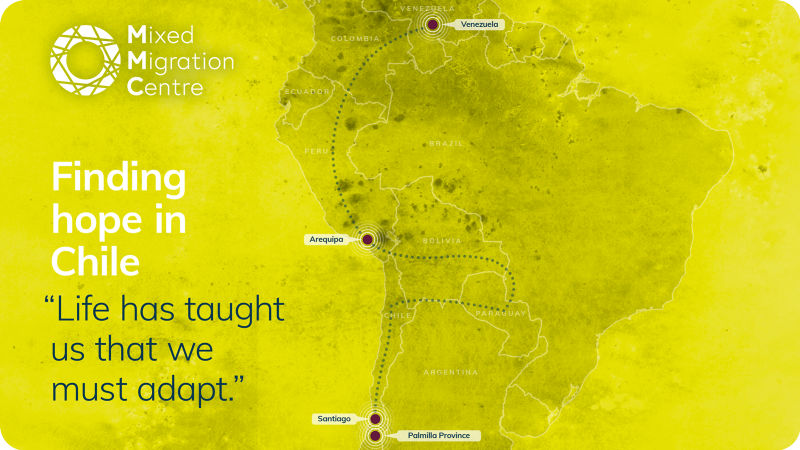
In 2020, the pandemic came. It was a very difficult time because my husband had been working cleaning and fixing things and giving karate classes (he has never exercised his own profession since we left Venezuela). For the first few months we couldn’t go out. It was a very severe pandemic that changed everyone’s life. When Pedro Castillo won Peru’s presidential election in July 2021 we decided to move. For us, socialism means misery. I got a part-time job, and we started saving, set a date for the first week of January 2022, sold everything and set off for Paraguay. Since my brother was heading to Chile we travelled together by bus to Bolivia where we separated. We had to pass through Brazil to get to Paraguay.
We arrived in Brazil as irregular migrants, and it was a very ugly experience. We felt like criminals. We didn’t understand Portuguese, and so it wasn’t easy to communicate. In Brazil, we had to take a taxi and a bus to get to the border with Paraguay, but it was horrible and took more than 24 hours. We were charged a lot—more than $250—for taking a taxi. They took advantage of us, which we did not realise at the time.
We only stayed in Paraguay for six months. I didn’t like it. Even with the weather: the heat was killing me! We came from the cold of Arequipa, in Peru, to temperatures of 40 degrees celsius with a thermal sensation of 45 degrees. I felt like I was in hell, it was horrible. At one point, my husband met a Venezuelan man who was traveling to Chile. That trip is difficult because you must walk through the Andes mountains. It’s cold: there is snow. And we had to be responsible because we were going to travel with the girls. We had to take a lot of precautions. So again we sold all our possessions except three sets of clothes each and used the money to pay for transportation. We got wet and couldn’t move our fingers. But there are still people with empathy, and in one village, people helped us, they let us change in their homes. I cried because it was very moving to see that there are still very good people in the world. Just as there are bad people, there are also very, very good people.
Despite not having regular documents, a month after arriving in Santiago, my husband got a job in a private company with a salary that is not bad. Then his boss changed his work location, and so three months ago we all moved to a village in Palmilla province. I like Chile because my daughters are getting a very high-quality education, and this is the part that pleases me. And the other thing is that these people [the Chileans] are economically progressing. Here in the village, I feel accepted. That’s the beautiful part of where we live, because here people are more empathetic. And when they see that you are with your family and that you’re not a bad person, they can give you a lot of affection.
I would like to go back to Venezuela. Actually, I would like to go back now because my mom says that she has been alone for so many years and I know she has suffered a lot. But I think we will stay here in Chile for a while, because I know Chile has opportunities and we can fulfil some of the dreams we have to be able to return eventually to Venezuela, my country.
Life has taught us that we must adapt, whether we like it or not, because there are situations we can’t control. When you migrate, you will live in cultures very different from your own, and you can’t expect people from other countries to adapt to your culture. We, the migrants, are the strangers. You have to migrate with an open mind, willing to do whatever it takes, because in these countries you’ll have to do everything, even cleaning bathrooms. If you don’t come with that disposition, you’ll suffer, life will hit you hard.
Everyone has dreams. Sometimes we want many material things, but the most important things are health, to work, and to feel happy. You can’t buy health, so I want to make an effort to take care of myself and my family.
Arriving in Malaysia on foot
“Every day is challenging.”
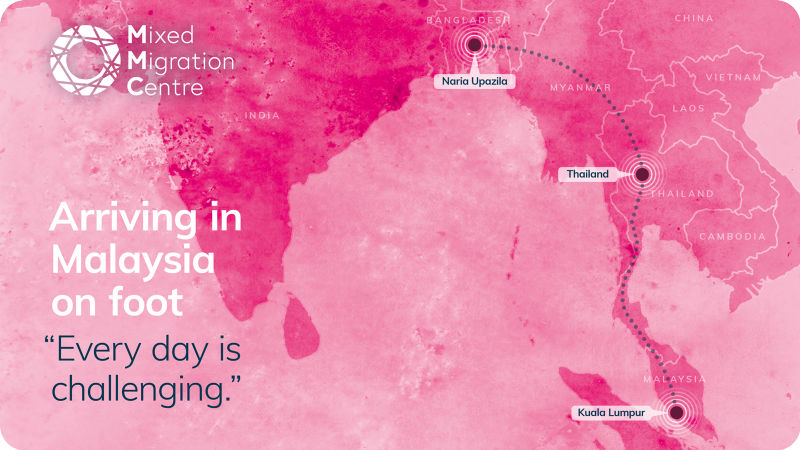
I come from a family of six, and as the eldest son, I feel responsible for supporting them. In Bangladesh, I couldn’t continue my studies due to financial constraints and because I had to support my family, including with the costs of my siblings’ weddings. After graduating from high school, I realised that getting a government job was impossible, and despite a lot of effort I couldn’t find any suitable work in Bangladesh and had to borrow money to support my family. That’s when I decided to move to Malaysia.
I arrived in Malaysia on foot in August 2021, via Thailand, to where I had flown on a tourist visa. I spent around $3,000, including fees for a broker I had to hire because it is not easy for poor Bangladeshis like me to get tourist visas.[1] I raised the money via loans from family and friends in Bangladesh as well as those who were already in Malaysia. Many Bangladeshis come to Malaysia this way. My own journey was much easier than some of the stories I have heard about people being thrown off overcrowded boats and spending days at sea with little food after setting off from Cox’s Bazar. I spent about a week in the forest between Thailand and Malaysia before being taking across the border on foot. I didn’t face any harassment.
I worked at a construction company for a month. They paid me well at first but from the second month they stopped paying me regularly and at one point withheld my salary for two months. So I left that company and joined another one, where the manager offered me the opportunity to apply for an RTK visa in exchange for a reduced salary.[2] I submitted my documents to him and got a new passport with his support. However, there was a lack of progress in the process, so I decided to leave that job. I recently applied for a new type of RTK visa. The results have not been announced yet, but I hope to provide my fingerprints at Malaysian immigration soon. The application cost me 2,000 ringgit ($440). I will have to pay an additional 2,000 ringgit during the fingerprinting. Along with my agent’s fees, the whole process will cost me 6,000 ringgit, not including the 4,500 ($990) or so I spent earlier, before the government introduced the new RTK visa.
I am currently sharing a room in Kuala Lumpur with nine other people. It’s actually a container designed to accommodate construction workers. Most of us are Bangladeshi, but there are also immigrants from other countries such as Indonesia, and some Rohingya. The conditions are unimaginable: the rooms are filled with bedbugs, there is no electric fan, and we have to share one toilet between 30-35 people. Sometimes things go missing, and there have been occasional fights, but most undocumented immigrants try to avoid conflicts or criminal activity as we know the Malaysian government is strict.
For the past year and a half I have faced many struggles. I know these struggles will continue until I receive an official status. Without proper legal status, every day is challenging, especially when it comes to finding employment. Being an “illegal” immigrant is a major obstacle for me. So far, I have not been caught by the police or by immigration officials. But as undocumented immigrants, we are always cautious about moving around and avoid unnecessary encounters with locals. We rely on our friends to help with grocery shopping and prefer not to venture out unless it is absolutely necessary.
Discrimination is everywhere in Malaysia, and I don’t understand why. The local people often look at us with suspicion, assuming we are here to steal. As Bangladeshi nationals, we are viewed differently. For example, bus drivers sometimes mistreat us on our way back from work at construction sites. Private transport services like e-hailing cancel our rides when they discover our nationality. They never provide an explanation. This happens frequently, not just to me, but also to my friends and other Bangladeshi students studying at universities in Malaysia.
But it would not be wise to return to Bangladesh considering my family’s circumstances and the financial investment I made in coming to Malaysia. It is difficult to leave now with the situation I am in. So, my plan is to stay here. The situation is challenging, but I’m still trying to make the best of it. I prefer not to encourage others to follow the same path, after going through all the struggles I’ve faced. Some of my friends have been showing interest in coming to Malaysia for a better life, but I have been strongly discouraging them.
[1] The official cost of a tourist visa for Bangladeshi nationals is around $33.
[2] The Workforce Recalibration Programme (RTK) is a government scheme to regularise undocumented migrants in Malaysia as foreign workers who are legally employed by qualified employers.